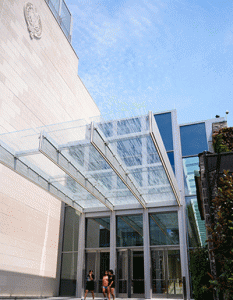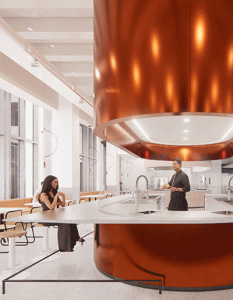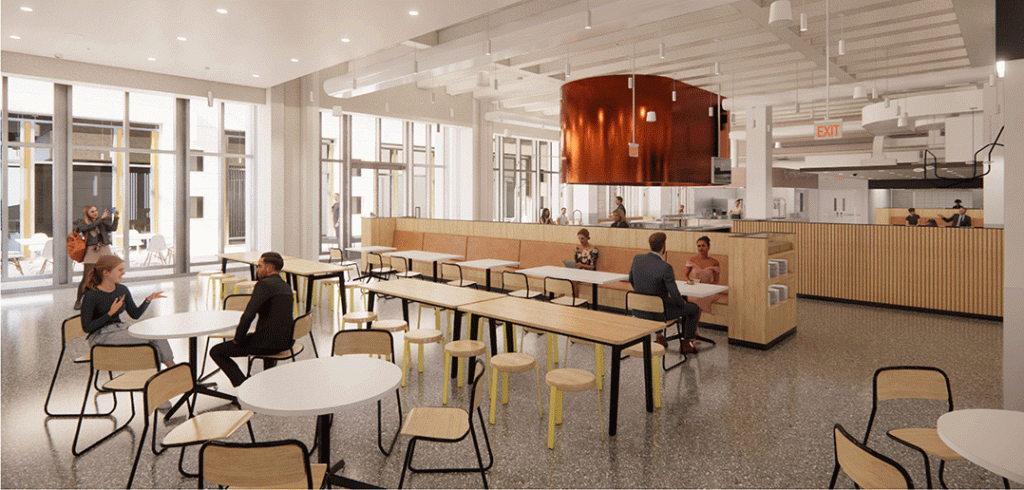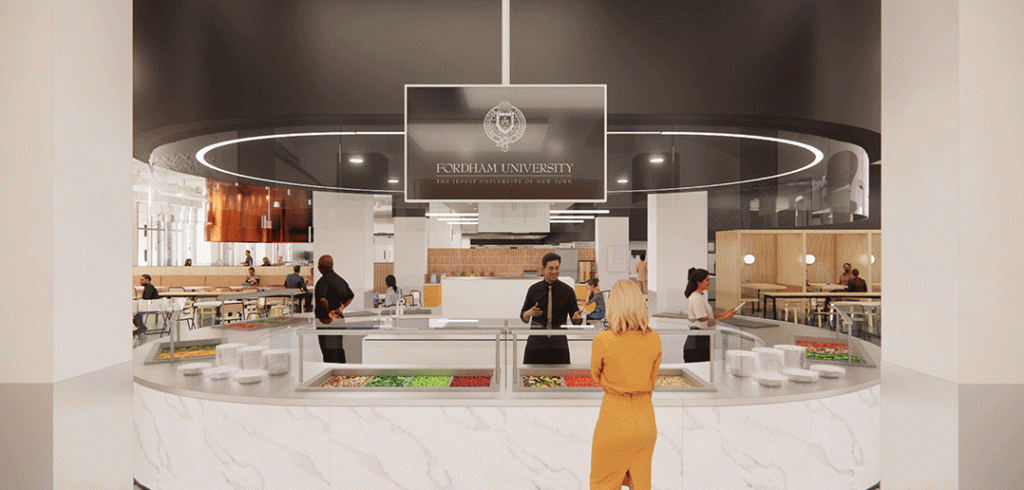The grant, which comes from the Higher Education Capital Match Program (HECap), is the second one of its kind that the University has received for the Campus Center.
It will help fund the ongoing transformation of what has become a vibrant hub for the Rose Hill campus since it opened last year.
The Heartbeat of Campus Life

The center, which nearly doubled in size when the 71,000-square-foot addition was finished in February 2022, features multiple spaces dedicated to making the campus a welcoming place for all.
A first-floor lounge features a pool table and plenty of couches and chairs for relaxing, while the ground floor has additional spaces to gather, recharge, and exercise in a state-of-the-art 20,000-square-foot fitness center.
The upper floors are occupied by the offices of Career Services and the Center for Community-Engaged Learning, while a light-filled arcade that opened in August makes for seamless traveling to the athletic facilities. The building is also designed to LEED Silver level specifications, with triple-glazed windows, automatic lighting controls, recycled materials, and, in a first for the Rose Hill campus, heat recovery mechanical ventilation wheels, which reuse the building’s heat in cooler months.
Dining in the Age of Customization
When the new Marketplace opens in the fall, it will feature nine different stations, covering cuisine ranging from halal, deli, and grill to pizza, salad, vegan, allergen-friendly, and dessert.
One of the most dramatic changes will be the way dishes will be prepared directly in front of customers.

As an example, Deming Yaun, university dining contract liaison, noted that at the vegan/vegetarian station, the centerpiece will be a large, oval kitchen stocked with ingredients that are washed, prepped, and cut as needed for every dish, some of which will be sent to decks of ovens in a nearby kitchen to be “finished off” and returned. The Halal/Za’atar kitchen, for instance, will feature dishes such as Mansaf-stewed lamb with yogurt and mint, salmon in fig leaves, and grilled beef and lamb skewers, all prepared in the open.
This allows for customized dining that students expect.
“Over the years, we have been moving food preparation into or as close to the serving area as possible, but this takes it to a whole new level,” he said.
A Hub For Community
The new Marketplace space will be more than just a place for sustenance. Michelle Burris, interim vice president for student affairs, said she expects it will become as much a locus of activity as the rest of the Campus Center.
“We refer to the McShane Center as almost the living room of our campus where students can gather,” she said. “A fully renovated Marketplace is going to make it even more of a destination for students not only to eat but to be in community with one another.”
Lesley Massiah-Arthur, associate vice president of the Office of Government Relations and Urban Affairs and special assistant to the president, said community building was key to winning the grant, which was awarded in September.
Massiah-Arthur, the author of the grant application, said a grant of this size is only distributed to projects that benefit the broader public.
“I was thinking about how the University was coming back from the pandemic, and I started to think about the importance of food and dining together,” she said.
As such, Massiah-Arthur cited not only an academic study that showed the benefits of communal dining but also highlighted how a dining facility will make it easier for Fordham to host outside groups for gatherings where food will be served. Next year, for example, the Bronx District Attorney’s office will be hosting a two-day forum at the Campus Center with other U.S. Attorneys General on gun violence prevention.
“Being able to open up the University again is essential to who we are not only as a university but as an anchor institution for the region,” she said.

Benefiting the Environment and Local Economy
Even before it opens, the renovation will have a positive economic impact on the Bronx. It will generate approximately 250 union jobs over the course of the contract, and 25% of those jobs will be filled by local businesses.
The university will also work with local businesses to implement a new waste management system. All disposable containers will be fully compostable, and working with Bronx-based businesses to meet its composting goals, Fordham will divert approximately 230,670 pounds of food waste a year from landfills.
Where Friendships Form
Ben Medeiros, FCRH ’22, a student in the mental health counseling program at the Graduate School of Education, was commuting to the Rose Hill campus when the McShane Center opened last year. It was just long enough a walk that he preferred to stay on campus between classes.
“I didn’t want to walk home every day after class. I thought, ‘Let me just chill here before my next club meeting.’ You want to get out of your dorm room or your apartment and sit there,” he said. “I made better friends there than I ever did anywhere else.”
—Additional reporting by Chris Gosier.

